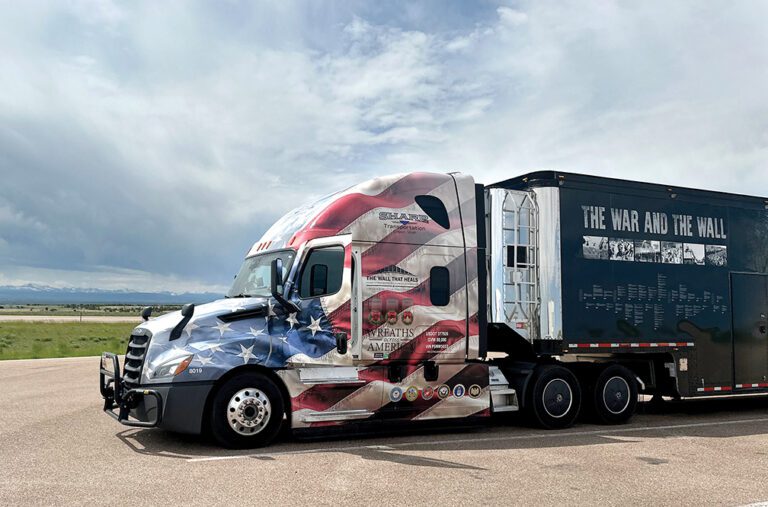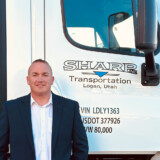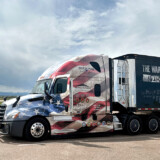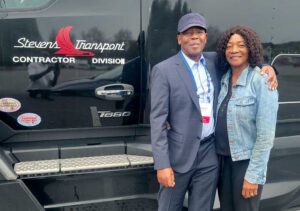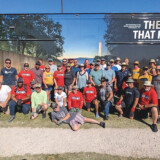
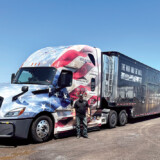
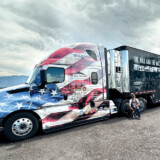
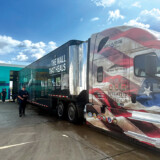
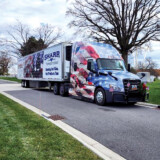
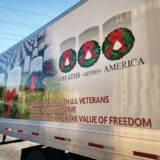

If you want to know if a carrier that claims to put drivers first really does so, take a look at their turnover rate. While some turnover is inevitable, an industry average that hovers around 100% is a strong indication that many drivers aren’t feeling the love.
On the other hand, a turnover rate of only 25% demonstrates that a carrier’s drivers are happy and want to stick around. That’s the feeling at Sharp Transportation.
Headquartered in Wellsville, Utah, where the Little Bear River runs through the Cache Valley, the carrier operates 190 company tractors, plus a dozen independent contractors, and about 500 dry and refrigerated trailers on regional runs in the western states. Sharp also handles longer hauls in the lower 48.
Sharp handles a variety of commodities including sporting equipment, foodstuffs, temperature-controlled loads, and general merchandise.
“We’ve been pushing driver retention,” said Kevin Boydstun, Sharp’s safety manager. “We’re way underneath the national average for driver turnover. You know, most of our turnover lately has been of our doing rather than the drivers.”
Boydstun credits Sharp’s company culture with its success in retaining drivers. It starts with stringent hiring requirements that help ensure drivers who are hired are the right fit for the company. Equipment plays a major role as well.
“We’ve got a really young fleet of newer equipment, and our trucks have all the creature comforts that the drivers are looking for,” he said. “That helps us maintain a low breakdown ratio, because they’re not getting paid sitting in shops.”
The Sharp fleet is primarily comprised of Freightliner trucks, but there are some Volvos and some Peterbilts in the mix.
“Some drivers request different brands of trucks,” Boydstun explained. “It can depend on where they came from and what they historically drove.” Most drivers, he said, seem to be satisfied with the Freightliner for its spacious area and storage.
When breakdowns or other problems do occur, the team at Sharp works to minimize the impact on the downtime.
“We’ll usually catch them a ride (in another Sharp truck) or a flight back in and get them into another truck so they can keep running,” Boydstun said. “With parts, supplies, and everything else, what should be a three-day downtime can become six or seven weeks, just waiting for a part.”
The company also pays monthly mileage and safety bonuses to its drivers, and it provides new trucks on a three-year trade cycle. Drivers can enjoy company provided STR Radio, a phone app that polls listeners to determine the music they’d like to hear. That music is interspersed with company messages thanking the drivers and providing information about safety and operations.
“We have driver interviews on there as well, so drivers can get information from other drivers in the fleet,” Boydstun added.
Dispatch methods at Sharp help facilitate the ability of drivers to assist other drivers.
“You know, there are several ways to go to, say, Dallas, Texas,” he said. “I like to keep everybody going down through New Mexico, across the Four Corners region into Texas versus running down through Denver.”
Doing so, he explained, avoids winter storms in the Colorado mountains and puts multiple trucks on the same lane.
“If we have an out to recover a load on a broken-down truck, or if a driver becomes ill or something, we have extra trucks on that lane rather than 50% of them running down through Denver,” he said.
Keeping trucks in certain lanes also facilitates obtaining favorable fuel pricing, according to Boydstun.
“The more gallons we can buy on one lane, the bigger the discount,” he said.
Sharp Transportation was founded by John T. Sharp in 1970. His son, Zan Sharp, acquired the company in 1990 and still holds the position as the company’s president and CEO; he is accompanied by his wife, Vivian, who is the company’s vice president. From a single location in Wellsville with just a few trucks, Sharp has grown to nearly 200 trucks. The carrier has offices in Salt Lake City; Twin Falls, Idaho; Wendall, Idaho; and Seattle.
Prior to taking the reins, Zan Sharp drove trucks for the company before moving into operations. Once he acquired the company, Sharp instituted his philosophy of, “We’ll do it,” a creed that emphasizes the carrier’s flexibility in serving its customers.
Boydstun has been with Sharp Transportation for more than two decades.
“I had been a driver and worked in operations with other companies, and Zan was looking for a change within his organization,” he said. “I came on in May 2002, and I’ve been here ever since — kind of wearing every hat in the building between dispatcher, planner, customer service, and sales. I recently moved over to safety. I guess I’ve worn all the hats.”
Sharp operates on McLeod software, communicating though Omnitracs units in the trucks. Drivers can access the system through their smartphones, inputting immediate information instead of waiting to get back to their truck.
Warehousing operations at Sharp’s sister company, Truman Truck Lines, help keep the freight flowing. Imported goods are transferred from the port to warehouse facilities, where freight is reloaded into Sharp trailers for delivery to their destination. Truman also provides warehousing for multiple companies in the PNW and assists customers in reworking loads and cross docking.
In other operations, orders are picked to customer request and then loaded on a truck and delivered.
The company is a proud participant in “The Wall that Heals,” a traveling exhibit that brings a replica of the Vietnam Veterans Memorial in Washington, D.C. to communities across the country.
“We’ve been participating in that since 2019,” Boydstun said. “We’ve had a couple of trucks that we’ve had specially wrapped for that purpose, which we reserve for our veteran drivers.”
Sharp also contributes trucks and drivers to the “Wreaths Across America” program, hauling wreaths to veteran cemeteries in the west as well as making the final delivery to Arlington National Cemetery.
Boydstun is proud of the continual growth at Sharp Transport.
“When I came to work for Sharp, we had around six people in the office and now we’ve probably got 30 to 35 including accounting, our safety and operations teams and driver recruiting,” he said.
By providing excellent customer service and ensuring that drivers are successful, Sharp Transportation ensures continued growth well into the future.
This article originally appeared in the September/October 2023 edition of Truckload Authority, the official publication of the Truckload Carriers Association.
Cliff Abbott is an experienced commercial vehicle driver and owner-operator who still holds a CDL in his home state of Alabama. In nearly 40 years in trucking, he’s been an instructor and trainer and has managed safety and recruiting operations for several carriers. Having never lost his love of the road, Cliff has written a book and hundreds of songs and has been writing for The Trucker for more than a decade.








